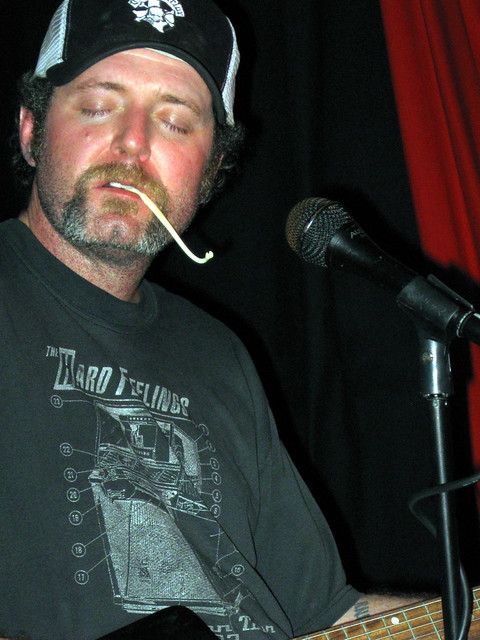March. 24 , 2017
“I’m here to tell you about something that just might save your life..”
Those are the first intelligible words you hear on The Bad Testament, the new album by Scott H. Biram — that dirty old one-man band from Austin — right after a few seconds of ambient radio noise and when the first song, “Set Me Free” actually begins.
I can’t honestly say this album saved my life or will save yours. But it sure won’t hurt. The important thing is, this might be the best Biram album yet.
While it boasts the basic Biram sound — his rough-edged voice over acoustic guitar and foot-stomping — as a songwriter, Biram just keeps improving. He can still rock hard and crazy, the best examples here being “TrainWrecker” and “Hit the River,” a wild instrumental. He’s not afraid to get obscene if the spirit says so, as he proves on “Swift Driftin’.”
And he has always had a way with good-time drinking songs like “Red Wine.” (One can easily imagine Texas honky-tonker Dale Watson singing this one.) But what Biram really has going for him is a knack for writing downright pretty blues-soaked country songs, and The Bad Testament has plenty of those.
“Still Around” is a minor-key song of a scorned lover, proud and defiant: “Go ahead and throw me down, I might be broke, I’m still around,” he sings. “I’m the weapon in your hand/I’m the stone that drags you down/I am the rock on which you stand/I am the one who hangs around.” The lyrics provide few clues as to what led to the singer’s angry words (“I have never been your friend/I’m just worn down by wind”), but the pain is audible. Plus there’s some pretty fancy near-flamenco fingerpicking in a couple of places here.
“Crippled & Crazy” could very well be autobiographical. Nearly 15 years ago Biram survived an auto accident — a head-on collision with a pickup truck — that basically broke every bone in his body. Those wounds apparently still haunt him, as do others.
With a sad electric organ adding a little texture, Biram sings of being “crippled and crazy and out of control” as well as being “sober and stupid” and “sold down the river.” On the heart-wrenching bridge he cries, “Calling all angels, all heartaches and demons, calling all lovers that left for no reason, down through the chamber that echoed the screamin’; twisted and turnin’ I just quit believin’ in love.’’
“Righteous Ways,” with its own sweet fingerpicking, sounds as if Biram has been listening to some Mississippi John Hurt. It’s an introspective number on which he yearns for a spirituality he knows he may never achieve. “I struggle all the time in my mind and in my heart,” he sings. “There’s just never enough time for righteous ways.”
But later on the album he makes a stab at righteousness, with “True Religion,” an a cappella tune that goes back at least as far as Leadbelly (and I suspect further). Biram’s probably being tongue-in-cheek here, seeing how the song is sandwiched between crazy religious radio samples. But in light of “Righteous Ways,” I suspect there’s a grain of earnestness too.
Biram may seem a little bit touched at times, but I think the angels are among those who touched him.
Also recommended:
Front Porch Sessions by The Reverend Peyton’s Big Damn Band. This “big damn band” consists of exactly three people: Josh Peyton on vocals and guitar; his wife, Breezy Peyton, on washboard and background vocals; and drummer Maxwell Senteney — three people and no more. So it might seem odd to describe this album as more stripped-down than previous albums, but that’s what it is.
The record wasn’t really recorded on Peyton’s front porch. But it sounds as if it might have been. It could be the soundtrack of a great summer barbecue, where the music is as tasty as the ribs.
There are not as many hard-chugging songs as on most of the albums by this Indiana trio. In some ways, Front Porch resembles the 2011 album Peyton on Patton, which was a solo album in which the Reverend played songs by blues pioneer Charley Patton.
The new album has several covers of blues greats as well: Furry Lewis’ “When My Baby Left Me,” Blind Willie Johnson’s gospel stomper “Let Your Light Shine,” and “When You Lose Your Money,” which is based on Lewis’ version of the classic bad-man ballad “Billy Lyons & Stack O’ Lee.”
Peyton’s originals are worthy as well. The sweet opening cut, “We Deserve a Happy Ending,” sung with Breezy, is a moderate tempo blues, accented by the Reverend’s slide, about marital joy. “Even when we’re losing, it feels like we are winning,” the couple sing.

The mood shifts with “What You Did to the Boy Ain’t Right,” on which the singer scolds, “I don’t want to fight, but what you did to the boy ain’t right.” It’s never spelled out what exactly was done to whom. We just know the Reverend don’t like it.
Then there is the slow “One Bad Shoe,” which works an existential metaphor about traveling unprepared, knowing there’s a good chance you won’t make it to your destination.
In the tradition of previous Reverend Peyton food songs — like “Pot Roast and Kisses,” “Born Bred Corn Fed,” and “Mama’s Fried Potatoes” — the final track on Front Porch Sessions is “Cornbread and Butterbeans.” Here Peyton celebrates “eatin’ beans and makin’ love as long as I am able.” It’s a well-deserved feast.
Let's see some videos
First, a couple from The Bad Testament
And now, Rev. Peyton












